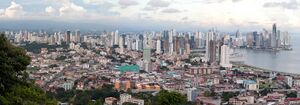Economy of Puertego
This article is a work-in-progress because it is incomplete and pending further input from an author. Note: The contents of this article are not considered canonical and may be inaccurate. Please comment on this article's talk page to share your input, comments and questions. |
 San Lina, the financial capital of Puertego | |
| Currency | Damillo (DMO, Đ) |
|---|---|
| Calendar year | |
Country group | |
| Statistics | |
| GDP | |
| GDP rank | |
GDP growth | 9.2% (2027) |
GDP per capita | |
GDP per capita rank | 6th (nominal, 2027) |
GDP by sector |
|
| |
Population below poverty line | |
| Template:IncreasePositive 0.646 medium | |
Labour force |
|
Labour force by occupation |
|
| Unemployment | 1.2% |
Average gross salary | Đ29,040 ($1,452) monthly (2027) |
| Đ19,166 ($960) monthly (2027) | |
Main industries | |
| External | |
Export goods | Tin, Natural Rubber, Sugar, Fish, Chemicals, Iron, Steel, Copper, Gold, Silver, Tobacco, Aluminum, Nickel, Zinc, Textiles, Machinery, Alcohol, Cement, Lithium, Paper, Diamonds, Refined Petroleum, Processed Food |
Import goods | Grains, Corn, Pharmaceuticals, Fertilizer, Livestock, Automobiles, Electronics, Crude Oil, Natural Gas, Coal, Electricity, Broadcasting Equipment |
FDI stock |
|
| $37,033 million (2028 est.) | |
Gross external debt | $931,012,417,698 (31 December 2027 est.) |
| Public finances | |
| |
Foreign reserves | $105.2 billion |
All values, unless otherwise stated, are in US dollars. | |
The economy of Puertego is a mixed socialist-oriented market economy with the private sector allowed to operate in much of the economy though state control still being common in many industries such as utilities and natural resources. The economy is one of the fastest growing on the continent with it consistently measuring 8-9% GDP growth every year with the economy showing no real signs of slowing in its growth any time soon unless a catastrophic event hits the economy unexpectedly. While the economy has seen rapid and continuous growth ever since 2008 there are still many people who critique many aspects of the economy such as the massive income inequality and poverty allowed to exist in it with Puertego having some of the worst income inequality in the entire world, there has also been criticism towards the countries heavy corruption in state run industries, lack of wage growth despite the growing economy, and the lack of a lot of social welfare commonly found in other countries.
The Puertegan economy was formerly almost exclusively based on farming cash crops and selling them abroad with things such as sugar and rubber however in recent times the economy has been moving to a more industrialized one with the country making it very easy and profitable for companies to outsource their production to Puertego, in recent times Puertego has become a large producer of things such as steel, textiles, chemicals, various refined metals, and aluminum though natural resource extraction still remains a large sector of the economy with mining copper, tin, zinc, nickel and other minerals as well as farming sugar, rubber, and tobacco still being large industries in Puertego. Services are a small sector of the economy with the government prioritizing industry and the only real service jobs are in shipping, finance, or banking or government operated utility companies. Remittances are the last part of the Puertegan economy with the country receiving an estimated $70 billion back from the 14 million Puertegan working abroad often in Pelaxia, Cartadinia, and Caphiria. The economy of Puertego is largely export based with exports outnumbering imports on a scale of 12 to 1, the country is one of the worlds largest importers of energy with them buying coal, oil, and natural gas from almost anyone aboard who will sell it to them as well as being a large importer of food.